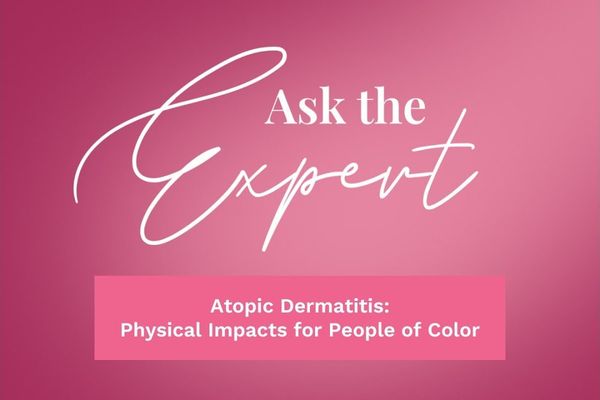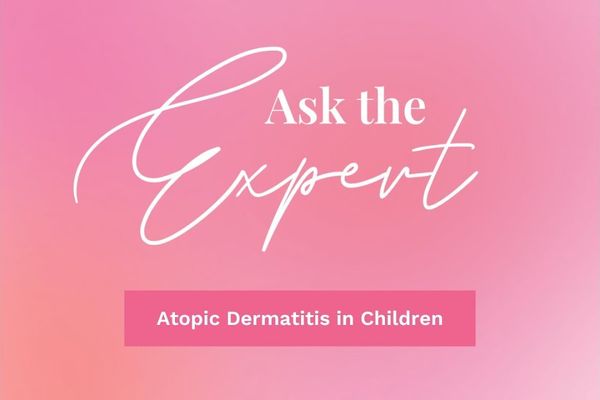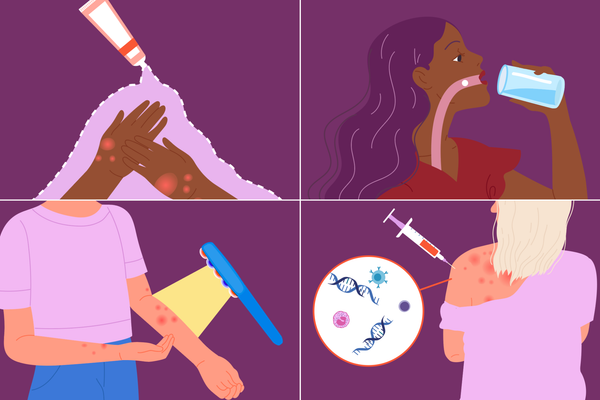The most common type of eczema, atopic dermatitis (AD) is a chronic inflammatory disease that causes red, itchy patches all over the body. More than 16.5 million adults and 9.6 million children in the United States are affected by AD.
While AD affects both women and men, hormonal changes during the reproductive years make the condition more prevalent in women. And women who have children with AD often take on the caregiver role, supporting their child's physical and emotional well-being while navigating medical appointments and health insurance.
Far more than just a skin condition, AD is a complex disease that can have a big impact on both physical and mental health. HealthyWomen asked Dr. Elizabeth Liotta, a dermatologist and member of HealthyWomen's Women's Health Advisory Council, to suggest questions you should bring up with your healthcare provider if you or a loved one has AD.
How do I differentiate AD from other types of eczema or other skin conditions?
Why this question is important:
Atopic dermatitis is the type of eczema that is typically associated with sensitive skin, allergies (including severe food allergies) and asthma. An accurate diagnosis of AD can help not just with deciding on the best course of treatment, but with raising awareness about any accompanying health conditions.
Can children and adults develop AD even if they’re not born with it?
Why this question is important:
AD is a hereditary condition, so you can't develop it if you haven't inherited it, although it may not be triggered until you're older. Knowing that AD is inherited highlights the importance of knowing your family history when it comes to AD, so you can watch for signs in yourself and your children.
Are there certain triggers that cause AD to flare up?
Why this question is important:
Because AD is linked to allergies, knowing which environmental factors, such as certain foods, pollen, pet dander, soaps or detergents, can trigger your symptoms is necessary for preventing flares. You and your provider can also discuss the emotional effects of AD and the way stress and anxiety may trigger symptoms.
Is AD considered a chronic condition?
Why this question is important:
It's important to understand AD is chronic because it means that people who have it will always be more likely to have flare-ups. "The majority of children grow out of it, but always have a tendency toward sensitive skin," Liotta said. "And AD sometimes reappears in adulthood."
Why is it important for me to manage my condition even when it’s been months or years since it flared up?
Why this question is important:
Any treatment plan you discuss with your healthcare provider should include addressing acute AD — when your condition is flaring — as well as prevention and maintenance. If you stop managing your AD because you're not experiencing symptoms, you may end up triggering a flare.
Can stress affect AD?
Why this question is important:
Liotta says stress aggravates all skin conditions, including AD. Stress can cause flares that lead to more stress, resulting in a vicious cycle. You and your provider can discuss ways to manage your stress so it doesn't make your AD worse.
What are my treatment options? Is there anything new available for treating AD?
Why this question is important:
Liotta suggests asking your provider about nonsteroidal barrier creams, which help protect and heal the skin. "The use of nonsteroidal barrier creams has really helped to prevent overuse of topical steroids and prevent flares," she said. She added that there is a newer injectable therapy available that can significantly reduce itching and flares.
Are there clinical trials going on for people with AD?
Why this question is important:
Clinical trials look at whether interventions like medication can safely and effectively treat health conditions and diseases. Clinical trials can be life-changing, especially in situations where a person has exhausted all their available treatment options. If there is a clinical trial being conducted that involves people with AD, you and your provider can discuss whether you're a candidate for participation.
What are the signs of a skin infection?
Why this question is important:
Liotta says people with AD are at higher risk of bacterial, fungal and viral infections. Openings in the skin caused by splitting, cracking and scratching can allow harmful organisms to enter the body. It's important to recognize the signs of infection like redness, swelling and tenderness so you know when to seek treatment.
How will my AD change as I get older?
Why this question is important:
People with AD in remission may see symptoms return as they get older. "AD can flare again as we age since the skin becomes more dry," Liotta said. Certain cholesterol medications may also aggravate AD. Hormone changes can also cause AD to flare, so women may experience symptoms before their monthly periods as well as during pregnancy and menopause.
How do I handle the cost of treating my AD? Any tips for navigating insurance issues?
Why this question is important:
Medical billing and health insurance can be difficult to understand, causing much confusion and frustration among people who are trying to figure out how to pay for the treatment they need. Your provider may be able to help you deal with insurance processes like prior authorization (PA), which is sometimes required before an insurer will pay for certain treatments.
As a caregiver of a child with AD, is there anything I can do to better manage my child’s care?
Why this question is important:
This question is a good one because your child's healthcare provider can be a crucial source of information, helping you separate fact from fiction when it comes to AD. A provider can also guide you toward evidence-based treatments, and may be able to share resources to help with cost and insurance issues. Since caring for a child with AD can be physically and emotionally exhausting, you may also want to ask your child's provider about support groups for caregivers.
This resource was created with support from Regeneron and Sanofi Genzyme.
- Atopic Dermatitis Shows Up on Your Skin, but Its Effects Go Much ... ›
- Atopic Dermatitis Across Your Body - HealthyWomen ›
- How Atopic Dermatitis Changes as You Age - HealthyWomen ›
- Coping With Atopic Dermatitis - HealthyWomen ›
- What Is Step Therapy? - HealthyWomen ›
- Options for Treating Atopic Dermatitis - HealthyWomen ›
- Inflammation May Be Contributing to Your Atopic Dermatitis - HealthyWomen ›
- Eczema and Children - HealthyWomen ›







